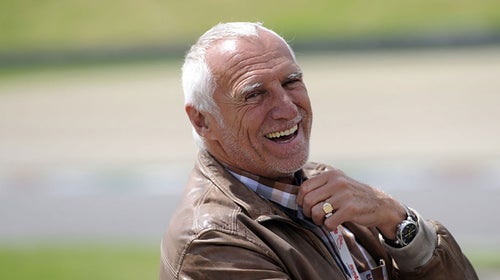Austrian billionaire and Red Bull co-founder Dietrich Mateschitz died on Saturday, October 22, at age 78. Reuters reported that Mateschitz passed after a long battle with cancer, and his death was confirmed by public relations attached to Red Bull’s Formula 1 auto racing team later Saturday afternoon.
Perhaps no businessperson had a greater influence on the global sports marketing landscape than Mateschitz did over the past three decades. The Red Bull logo has become ubiquitous at Formula 1 races, European soccer matches, Alpine ski events, and many other tournaments and games.
Under Mateschitz’s direction, Red Bull also played a major role in the growth of outdoor and adventure sports. Perhaps no brand flexed its might—and spent more dollars—than Red Bull did to bring action sports like snowboarding and BASE jumping to mainstream consumers. In 2001 Outside ranked Mateschitz No. 1 on our list of influential people in the outdoor world, ahead of Patagonia founder Yvon Chouinard, snowboarder Shaun White, and Jacques Rogge, the president of the International Olympic Committee.
For that story, Canadian climber Will Gadd called Red Bull “the modern patron—no, the saint—of action sports.”
At the time of his death Mateschitz had a fortune estimated at $27.4 billion by Forbes. He co-founded Red Bull in 1984 alongside Thai businessman Chaleo Yoovidha after drinking Yoovidha’s hyper-caffeinated drink Krating Daeng to overcome jet lag. The two partnered on a venture to adopt the beverage for Westerners, and in 1987 they debuted the drink in Europe.
Red Bull began selling in the United States in 1997, and its investment in action sports began shortly thereafter. The arena seemed a natural sponsorship fit for the go-go beverage, which by the late 1990s had become a popular mixer in dance clubs and late-night bars. Red Bull branding featured imagery of adrenaline-packed stunts and death-defying action, and Mateschitz himself coined the brand’s slogan: “Red Bull gives you wings.”
In the ensuing decades, the brand became synonymous with risky and death-defying stunts, like cliff diving and aerial skiing. In a 2002 Outside feature, journalist Rob Walker wrote about a Red Bull’s rapid rise in the outdoor sports world, and about its mystique amongst sports marketers.
“Extreme sports deliver on that need to, to…vibrate, in a way. Red Bull is one of the first products I’ve seen that delivers on that energy,” said Marc Gobé of the branding firm Desgrippes Gobé Group. Later in the same story, Walker chronicled a hilarious Red Bull-sponsored event in which five kite boarders attempted to sail from Florida to Cuba (which ended in misadventure and injuries).
Over the years, Red Bull-sponsored athletes have parachuted from the stratosphere, mountain biked down mineshafts, kayaked off impossibly high waterfalls, and piloted wingsuits into active volcanoes. Simultaneously, the company has sponsored sporting events that force athletes to push the boundaries of both skill and fear. These days, Red Bull sponsors hundreds of athletes across a wide swath of outdoor and action sports, from climber Sasha DiGiulian, to kayaker Nouria Newman, to pro cycling Justin Williams, and others.
Few know for sure whether Mateschitz himself was actually a fan of mountain biking, big-wave surfing, or the other action sports he helped fund. The Austrian was famously reclusive and refused interviews. Red Bull declined to make Mateschitz available for any Outside story on the company and its athletes over the years.
“He doesn’t like the media,” a spokesperson told Walker for his 2002 story.

